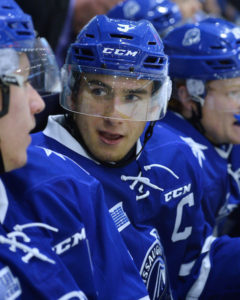Success is nothing new for the Mississauga Steelheads, however, neither the franchise itself nor its loyal fanbase could have predicted the prosperity the team would enjoy in 2016-17.
Despite struggling out of the gate, the Steelheads, a team whose roster had undergone significant change following the 2015-16 campaign, began firing on all cylinders and wound up not only clinching a place in the postseason but winning the Central Division crown.
In fact, 2016-17 marked the most successful season of the Steelheads’ franchise to date, as Mississauga set new highs in team wins with 34 and points with 81 – 10 greater than their previous best.

Led by a plethora of NHL drafted talent, as well as a number of those who will be eligible in coming years, the Steelheads’ success resulted from their fantastic combination of lethal offensive threats, sound defenders, and reliable goaltenders. Further, this specific mixture generated a strong chemistry between the Steelheads’ players, and one which was ultimately powered the play, and success, of the team as the campaign progressed.
So, with the 2016-17 OHL season in the books, let’s take some time to break down the Steelheads’ campaign and how it unfolded over the course of 68 games.
Forging an Identity
Mississauga’s fifth season as a franchise was by no means short of its adversity.
At times, the Steelheads, like all OHL teams, endured their fair share of hardships. Whether it was injuries to crucial players, the inability to put forth a consistent effort, or simply the inability to close out games, the 2016-17 season presented a wealth of obstacles for the ‘Trout to overcome.
The Steelheads are very top-heavy, and their goaltending has been poor, but their immense struggles may be the OHL’s biggest surprise.
— Todd Cordell (@ToddCordell) December 3, 2016
Yet, overcome they did, and although the team’s play varied wildly at times throughout the campaign, the squad was able to gain consistency as the season progressed. In doing, the Steelheads established themselves as one of the top teams in the Eastern Conference, and one who would put forth its best effort on a nightly basis.
In order to better understand Mississauga’s play throughout the 2016-17 campaign, it is helpful to break the season down into 10-game segments.
|
Record |
GP: 1-10 | GP: 11-20 | GP: 21-30 |
GP: 31-40 |
GP: 41-50 |
GP: 51-60 |
GP: 61-68 |
|
Overall |
4-5-1 | 2-3-5 | 4-6 | 6-2-2 | 6-1-3 |
6-2-2 |
6-2-0 |
| Home |
3-3-0 |
1-2-3 |
0-2-0 | 2-1-2 |
3-0-0 |
4-1-2 |
3-1-0 |
|
Away |
1-2-1 | 1-1-2 | 4-4-0 | 4-1-0 | 3-1-3 |
2-1-0 |
3-1-0 |
| Points | 9 | 9 | 8 | 14 | 15 | 14 |
12 |
Games 1-10: A Slippery Slope
Despite icing a high-flying team offensively to begin the season, the Steelheads overlooked their ability to keep the puck out of their own net, and especially so on the penalty-kill.
Over Mississauga’s first 10 games, the team allowed a whopping 40 goals against, or an average of four per game. With defensive breakdowns galore, the ‘Trout struggled mightily in their own zone, an issue exacerbated by the injury to newly acquired Vili Saarijarvi, an incredibly agile defender with fantastic puck moving skills.
Firebirds acquire Everett Clark & draft picks from @OHLSteelheads for Saarijärvi. DETAILS: https://t.co/B2FJBXdqWa pic.twitter.com/xLnK6Cuddb
— X Flint Firebirds (@FlintFirebirds) June 24, 2016
As a result, the Steelheads, who had massive expectations placed upon them given their strong roster, stumbled, if not fell, out of the gate. Skating to a 4-5-1 record, the Steelheads picked up just nine points in their first 10 contests. The failure to secure multiple goal leads damaged this output, and surely robbed Mississauga of value points in the standings.
Given their lack of success and failures on the blue line, the Steelheads made a statement by trading Sean Day to the Windsor Spitfires.
Games 11-20: Rock Bottom
As the Steelheads rounded out the month of October, the team’s struggles persisted.
Allowing another 42 goals against over their next 10 games, Mississauga endured a horrendous five-game losing streak which included a disheartening loss to the Sudbury Wolves and two decisions to the high-powered Oshawa Generals.
Still struggling on the penalty-kill, the Steelheads dropped five of their six home games and slumped to the bottom of the Eastern Conference.
Don’t forget leagues worst powerplay and second worst penalty kill. Special teams not working for Steelheads right now. #OHL #Steelheads https://t.co/akk4o6MdD4
— Andrew Torti (@TortiSport) December 1, 2016
Recognizing the need to add additional passion and drive into his team, General Manager James Boyd made arguably the best trade of the OHL season. Acquiring Spencer Watson from the Kingston Frontenacs, Boyd added a proven scorer whose consistency and leadership would be of great benefit to a young Mississauga team.
Games 21-30: Sink or Swim
As the Steelheads moved into the midst of a long OHL season, the team’s play began to improve, but not after shedding a disastrous nine-game losing streak. Over this period of ineptitude, the ‘Trout were outscored 47-25 by their opponents, allowing an immense five goals against per game which once again highlighted Mississauga’s poor defensive play.
However, the debut of Saarijarvi, who had yet to play due to injury, immediately changed the team’s defensive outlook, as, paired with Jacob Moverare, Saarijarvi immediately aided the ‘Trout’s under-performing back-end.

Infuriated by their terrible play of late, the Steelheads set out to change their direction and perception as a team. Taking to the road, Mississauga won four straight games against tough competition – defeating the Kitchener Rangers and London Knights in the process.
Further, when Watson returned from injury on Dec. 7, 2016, he too set out to prove his acquisition was a worthwhile one, scoring two hat tricks and six goals while adding one assist in his first three games with the team. Meshing spectacularly with Michael McLeod, Watson’s presence provided Mississauga with instant leadership and accountability.
Games 31-40: Swimming Upstream

As the 2016-17 campaign reached its mid-way point, the Steelheads began to catch fire, and finally began to display the skills and potential specific to, to date, their under-performing team.
Posting a 6-2-2 record, Mississauga picked up 14 points over their next 10 games – the highest number of points they had accumulated over a 10 game period to date. Outscoring their opposition 30-24 in the process, the Steelheads had finally begun to play a sound defensive style, and one that allowed the team’s offense to flourish.
Contributing greatly to the mix was the play of rookie goaltender Jacob Ingham. Despite, like the majority of the team, battling to begin the season, Ingham began to find his groove and quickly out-competed veteran netminder Matthew Mancina for the starting role. An essential component of the Steelheads’ present, as well as future, Ingham’s play was critical in stabilizing the team as a whole.
Games 41-50: Swimming Strong
As the ‘Trout worked their way towards the end of the season, they continued their impressive push up the Central Division standings.
Over their next 10 game stretch, Mississauga put forth their best stretch of hockey throughout the entire season, grabbing 15 points and a 6-1-3 record in the process. Securing such success would not have been possible without the stellar play of Owen Tippett, who, despite missing three games during this stretch, still wound up scoring five goals and 11 points.
#SWTP Player to Watch: Owen Tippett (@TippettOwen) @OHLSteelheads.#NHL shot and skating ability.
VIDEO PROFILE: https://t.co/jD6GiyRzkU pic.twitter.com/GkRWSuSQkI
— CanadianHockeyLeague (@CHLHockey) January 30, 2017
In enjoying this success, the ‘Trout also won a number of games key to their playoff push. Most notably, the Steelheads knocked off each team within their division within a two week period, an incredible feat considering all of which remained in the playoff conversation at the time.
Games 51-60: Consistent Fish
With the end of the 2016-17 OHL season in sight, the Steelheads refused to let their feet off of the gas pedal, performing admirably on a consistent basis and establishing themselves as a team to beat in the Eastern Conference.
Posting a 6-2-2 record and another 14 points in their final 10 game stretch of the campaign, Mississauga, after dropping two difficult contests to the Erie Otters, bounced back with a decisive 5-3 win over the high-powered Owen Sound Attack before pumping the Eastern Conference-leading Peterborough Petes 10-1 a few nights later.

With Ingham leading the team from the crease, the Steelheads’ commitment to a defense-first style of play allowed for the growth of a confident team. As a result, the ‘Trout’s offense exploded with creativity and capability, with speed and skill the trademarks of the team’s lethal scorers.
Games 61-68: Top of the Food Chain
Having enjoyed a remarkable turnaround from the beginning of their season, the Steelheads officially clinched a playoff spot on Feb. 27, 2017. Yet, this was only the beginning, as Mississauga would claim their first Central Division Championship mere days later with a 4-3 victory over the Hamilton Bulldogs on Mar. 4.
And there you have it!
Say hello to your 2016-17 Central Division Champions! #GoSteelGo pic.twitter.com/SVkSk2UPgI
— Y – Mississauga (@OHLSteelheads) March 5, 2017
A sound defensive squad with elite offensive performers and a sensational rookie netminder, the Steelheads developed themselves into a legitimate contender over the course of a season. Focusing on areas of weakness, Mississauga worked tirelessly on their special teams play and wound up finishing the season with the ninth-best penalty kill after enduring the majority of the campaign with one of the worst.
Determined to improve on a nightly basis and display their skills in doing so, the Steelheads’ season is one best defined not only by its success but perhaps more importantly, by its persistence.
The Top Performers
Although the Steelheads’ success in the 2016-17 season was undoubtedly a team effort, it remains worthwhile to highlight the contributions of individual players, as, without their efforts, Mississauga would not be a legitimate J. Ross Robertson Cup contender.
Most Valuable Player – Spencer Watson

Despite missing a considerable amount of the season due to a wrist injury, Watson debuted with the Steelheads and was immediately a consistent offensive force and leader throughout the season.
Voted as the Eastern Conference’s Smartest Player in the 2016-17 Coaches Poll, Watson’s incredible hockey I.Q. in all zones made him a reliable player for Head Coach James Richmond, and one who could be called upon to play in any situation. Further, his presence on the team’s top line alongside McLeod resulted in instant chemistry, as the unrivaled work ethic of the two stars combined to create one of the OHL’s most intimidating forward lines.
As the Steelheads head into the postseason, Watson’s value to the team will once again be ever-present, as his leadership and postseason experience will be crucial in guiding Mississauga through the endless rigors and hardships laying in wait.
Although he isn’t the flashiest player, Watson is arguably the most consistent and well-respected leader within the Steelheads roster.
Top Forward – Michael McLeod

Considered to be one of the hardest working players in the OHL, a sentiment echoed in the OHL Coaches Poll, McLeod is a speed demon who is as lethal as he is consistent on a nightly basis.
Selected to the Canadian World Junior Team, McLeod shone on junior hockey’s highest stage and parlayed his success with Team Canada into a dominant season with the Steelheads. Setting new career-highs in goals with 27 and points with 73, McLeod also dominated in the faceoff circle winning 61.2% of his draws.
In the postseason, McLeod will be looked upon to play the same competitive game he displayed in the regular season and which has become his trademark. Capable of accepting a pass at full speed and driving the puck to the net, McLeod’s success will be essential to the Steelheads’ offensive attack. However, given the skills and production he has displayed in his three seasons with the team, it is safe to say Mississauga is in good hands.
After all, there is a reason why he is the team’s Captain.
Top Defenseman – Vili Saarijarvi
A third-round selection of the Detroit Red Wings, Saarijarvi’s arrival from Flint in the 2016 off-season immediately altered the Steelheads’ blue line. A crafty, agile and smart defender with incredible offensive instincts, Saarijarvi’s presence added greater offensive depth to Mississauga’s roster.
Possessing a fantastic shot and the ability to quarterback the Steelheads’ power-play, Saarijarvi posted 31 points in just 34 games played in 2016-17, including 11 goals. His incredible abilities also earned him the distinction as the Best Offensive Defenseman, according to the OHL Coaches Poll.
Vili Saarijarvi relieved to finally be playing with the Steelheads. https://t.co/MC09OUQ1wQ pic.twitter.com/EnZD9cpOVf
— Iain Colpitts (@IainMissiNews) November 26, 2016
Logging major minutes on a nightly basis and a force at both ends of the ice, the Steelheads have and will continue to rely heavily on Saarijarvi to play a shutdown defensive role as well as provide Mississauga with offense from the back-end.
Although the likes of Jacob Moverare, Stefan LeBlanc, and Nic Hague also enjoyed phenomenal seasons, Saarijarvi’s presence, and importance, to the Steelheads was simply unmatched.
Best Goaltender/ Top Rookie: Jacob Ingham
When the 2016-17 OHL season began, the Steelheads’ situation between the pipes was vague at best.
Having acquired Matthew Mancina from the Peterborough Petes over the offseason, the veteran netminder was the likely candidate for the starting role. However, Ingham, alongside Joseph Murdaca, were also in the mix despite their lack of league experience. So, when the season began, Mancina was handed the starting role, while Ingham was assigned to the backup role.
At first, Ingham played sporadically, and understandably so. As a rookie OHL goaltender, playing time is typically sparse as a given netminder acclimates himself to a league of a higher level of skill and the gifted shooters which call it home.
So, it only made sense for Ingham to struggle out of the gate, as doing so is not uncommon. In his first nine games, Ingham played to a 2-4-3 record, although his play certainly wasn’t helped by the rest of the Steelheads’ roster, who, as we saw, struggled mightily. However, Ingham quickly grasped what was necessary to succeed at the OHL level, as he seemed to find his confidence following his first career shutout on Dec. 30.
Congratulations to @OHLSteelheads net minder @JakeIngham, who recorded the first #OHL shutout of his career tonight! A perfect 23/23! pic.twitter.com/G1OKLTD7yQ
— Brett Slawson (@brettslawson92) December 31, 2016
In fact, from the beginning of 2017 to the conclusion of the season, Ingham posted an incredible 13-3-3 record, and one which saw him boldly and undoubtedly claim the starting job in doing so. Despite the odds of a rookie goaltending starting for a Division champion, such is exactly the case for the Steelheads and Ingham, and will surely be as the postseason begins.
However, Ingham was not only Mississauga’s top goaltender in 2016-17 but also the team’s top rookie. Although the Steelheads iced only six rookies, Ingham was by and far the best of the lot. How so? Well, Ingham played the fourth most games of any OHL rookie netminder, while his goals against average also ranked fourth and his save percentage third amongst rookie goaltenders.
Further, he was the only OHL rookie to record two shutouts during the 2016-17 season.
Improving on a nightly basis and displaying his ability to adapt to changing circumstances both consistently and with ease, Ingham is an incredibly important, if not crucial, member Mississauga’s roster, and will be for the considerable future.
The Final Numbers
To end, let’s take a quick look at the Steelheads final statistics from the 2016-17 OHL campaign. Although this isn’t a full list, here are the top-five statistical performers offensively and defensively, as well as Mississauga’s two goaltenders.
Offense
|
Player |
GP | Goals | Assists |
Points |
|
Tippett |
60 | 44 | 31 |
75 |
|
M. McLeod |
57 | 27 | 46 |
73 |
|
Watson |
41 | 28 | 25 |
53 |
|
Bastian |
58 | 16 | 29 |
45 |
| R. McLeod | 68 | 9 | 33 |
42 |
Defense
|
Player |
GP | Goals | Assists |
Points |
|
Hague |
65 | 18 | 28 | 46 |
|
LeBlanc |
66 | 7 | 30 |
37 |
|
Moverare |
63 | 2 | 30 |
32 |
|
Saarijarvi |
34 | 11 | 20 |
31 |
|
Gibson |
65 | 3 | 7 |
10 |
Goaltending
| Goaltender |
GP |
Record | G.A.A. |
SVP% |
|
Ingham |
31 | 17-6-6 | 2.69 | .907 |
|
Mancina |
44 | 16-15-7 | 3.25 |
.899 |